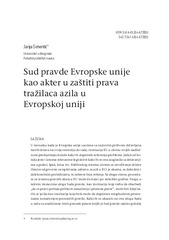Приказ основних података о документу
Sud pravde Evropske unije kao akter u zaštiti prava tražilaca azila u Evropskoj uniji
Court of justice of the European union as the actor in the protection of asylum seekers rights
| dc.creator | Simentić Popović, Janja | |
| dc.date.accessioned | 2023-10-17T14:13:58Z | |
| dc.date.available | 2023-10-17T14:13:58Z | |
| dc.date.issued | 2017 | |
| dc.identifier.isbn | 978-86-6425- 039-9 | |
| dc.identifier.uri | http://rfpn.fpn.bg.ac.rs/handle/123456789/1053 | |
| dc.description.abstract | U trenutku kada je Evropska unija suočena sa najvećim prilivom državljana trećih država na svoju teritoriju do sada, institucije EU u okviru svojih nadlež- nosti preduzimaju korake kako bi doprinele rešavanju problema. Jedan od ko- raka jeste i izmena relevantne legislative kako bi se ona usaglasila sa dešavanji- ma u praksi. Ipak, kriza tzv. Dablinskog sistema (sistem za utvrđivanje države članice odgovorne za ispitivanje zahteva za azil u EU) je akutna, sa dubokim i dalekosežnim posledicama, te zahteva brza rešenja. Sa druge strane, procedu- ra za izmenu pravnih akata u EU može da traje i po nekoliko godina. Stoga, u takvim trenucima uloga Suda pravde, kao institucije koja treba da obezbedi „da se pravo poštuje prilikom tumačenja i primene prava”, može biti ključna. On se javlja kao institucija koja brže može da doprinese neophodnim prome- nama tumačenjem postojećih pravila. Kako bi se ukazalo na ovu ulogu Suda u radu su analizirane četiri presude putem kojih je Sud pravde ojačao položaj pojedinca u Dablinskom sistemu kroz tumačenje dometa pravnog leka koji je na raspolaganju pojedincima u pogledu osporavanja odluke o transferu u drugu državu. Nakon objašnjenja delovanja Suda predstavljen je nov nacrt izmena i dopuna Dablinske regulative iz maja 2016. godine, koji je još uvek u procedu- ri, i ocenjeno je da u njemu praksa Suda pravde nije u potpunosti kodifikova- na. Ukazano je i na to da će takav predlog Komisije najverovatnije biti usvojen od strane Evropskog parlamenta i Saveta EU, i dat je odgovor na pitanje šta će Sud pravde u tom slučaju moći da učini kako bi nastavio da bude akter u zašti- ti prava tražilaca azila. | sr |
| dc.description.abstract | In the times when European Union is faced with the biggest influx of third counties’ citizens to its territory until now, EU institutions are taking different steps in order to contribute to the solution of the problem. One of the steps is the change in the relevant legislation in order to harmonize it with the ongo- ing events. However, the crisis of the Dublin system (system for establishing the member state responsible for examining an application for asylum in the EU) is acute and its consequences are far-reaching, and it calls for quick and effective solutions. On the other hand, procedure for necessary change in the legislation might take up to several years. In these cases, the role of the Court of Justice of the European Union (CJEU), as the institution that is to „ensure that in the interpretation and application of the Treaties the law is observed” can be crucial. CJEU is an institution that can generate the necessary changes in shorter period of time. In order to emphasize this role of the CJEU this Article analyses four judgments in which CJEU strengthened the position of the asy- lum seekers in the Dublin system. It did it by interpreting the scope of the le- gal remedy that is available to asylum seekers regarding the decision to transfer them to the other Member State. After the explanation of the Court’s role, the amendments to Dublin regulation of May 2016 are presented. It is concluded that this proposal does not codify the case-law of the CJEU. Also, it is presumed that European Parliament and Council of the EU will adopt the said amend- ments as proposed by the Commission, thus putting into question the signifi- cance of the previous Court’s practice. Therefore, it is presented what are the ways in which CJEU can continue to act as relevant actor in the protection of the rights of the asylum-seekers. | sr |
| dc.language.iso | sr | sr |
| dc.publisher | Beograd : Udruženje za političke nauke Srbije | sr |
| dc.publisher | Beograd : Fakultet političkih nauka | sr |
| dc.rights | openAccess | sr |
| dc.rights.uri | https://creativecommons.org/licenses/by/4.0/ | |
| dc.source | Demokratski otpori normalizaciji autoritarizma u Evropi | sr |
| dc.subject | Sud pravde Evropske unije | sr |
| dc.subject | tražioci azila | sr |
| dc.subject | Dablinska regulativa | sr |
| dc.subject | pravni lek | sr |
| dc.subject | odluka o transferu | sr |
| dc.subject | Court of Justice of the European Union | sr |
| dc.subject | asylum seekers | sr |
| dc.subject | Dublin regulation | sr |
| dc.subject | legal remedy | sr |
| dc.subject | decision on transfer | sr |
| dc.title | Sud pravde Evropske unije kao akter u zaštiti prava tražilaca azila u Evropskoj uniji | sr |
| dc.title | Court of justice of the European union as the actor in the protection of asylum seekers rights | sr |
| dc.type | conferenceObject | sr |
| dc.rights.license | BY | sr |
| dc.citation.epage | 291 | |
| dc.citation.spage | 273 | |
| dc.identifier.fulltext | http://rfpn.fpn.bg.ac.rs/bitstream/id/2832/fulltext.pdf | |
| dc.identifier.rcub | https://hdl.handle.net/21.15107/rcub_rfpn_1053 | |
| dc.type.version | publishedVersion | sr |

